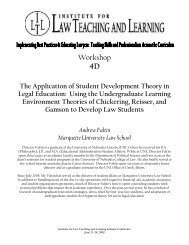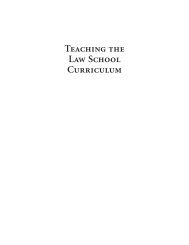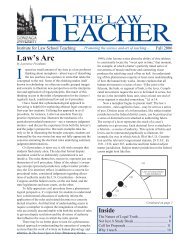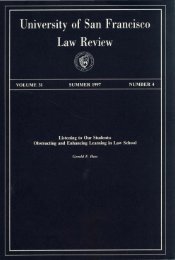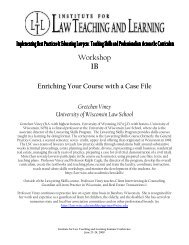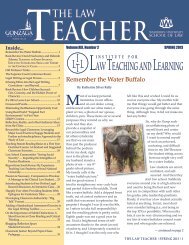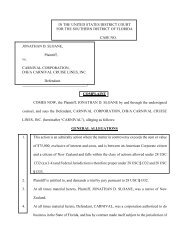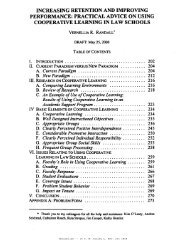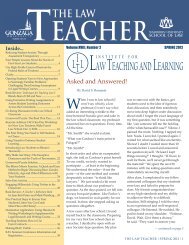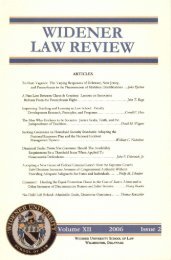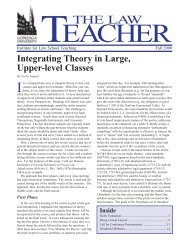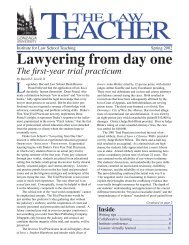The Law Teacher - Institute for Law Teaching and Learning
The Law Teacher - Institute for Law Teaching and Learning
The Law Teacher - Institute for Law Teaching and Learning
You also want an ePaper? Increase the reach of your titles
YUMPU automatically turns print PDFs into web optimized ePapers that Google loves.
enhancing Instruction with Online Limericks<br />
— continued from page 22<br />
here’s another exchange. I only drew<br />
one response, so I closed with a reply<br />
that I hoped was a memorable “hook.”<br />
although the exchange was with only<br />
one student, all members of the class had<br />
access to it.<br />
<strong>The</strong>re once was a plaintiff named Day<br />
Whose attempt to collect money went<br />
astray.<br />
Though he built a fine wall,<br />
he got nothing at all<br />
'Till a judge said that caton must pay.<br />
Elias: Day v. canton. <strong>The</strong> rule of law<br />
in this case falls under the premise of<br />
acceptance by silence, most notably<br />
from restatement 69(a). where an<br />
offeree takes the benefit of offered<br />
services with reasonable opportunity<br />
to reject them <strong>and</strong> reason to know that<br />
they were offered with the expectation<br />
of compensation. caton knew that he<br />
would benefit from the building of<br />
the wall, <strong>and</strong> he also knew that Day<br />
would want to be paid <strong>for</strong> his services<br />
of putting up the wall. Caton observed<br />
the wall going up <strong>and</strong> said nothing,<br />
<strong>and</strong>, there<strong>for</strong>e, a promise to pay Day<br />
can be inferred by caton's silence since<br />
he never rejected the work that Day<br />
was doing.<br />
Prof. Stockmeyer: right on. Day<br />
v caton is an example of how<br />
restatement sec. 69(1)(a) works. So if<br />
someone sees you leaving the building<br />
<strong>and</strong> asks “are you a law student?” <strong>and</strong><br />
you proudly answer “Yes, I am,” <strong>and</strong><br />
that someone then says, “I'm not so<br />
sure. Give me an example of sec. 69(1)<br />
(a),” you can tell her the parable of<br />
Day sweating in the hot sun building a<br />
party wall while caton silently watches<br />
from his lounge chair, sipping a pina<br />
colada.<br />
This final example gave me an<br />
opportunity to make a point about a<br />
topic (damages <strong>for</strong> delay) that I did not<br />
have time <strong>for</strong> in class:<br />
<strong>The</strong>re once was a young man named<br />
hadley<br />
whose contract of transport went<br />
badly.<br />
“My mill shaft is gone,<br />
all my goods are in pawn<br />
<strong>and</strong> my business is closed,” he said<br />
sadly.<br />
Phillip: <strong>The</strong> case is hadley v<br />
Baxendale. If a party is made aware<br />
that a breach of the contract will<br />
result in damages to the other party<br />
<strong>and</strong> those damages are reasonably<br />
<strong>for</strong>eseeable at the time the contract<br />
is entered into, the party in breach<br />
will be responsible <strong>for</strong> the damages.<br />
Un<strong>for</strong>tunately <strong>for</strong> hadley, this law did<br />
not help him out because at the time of<br />
the creation of the contract he did not<br />
adequately communicate the fact that<br />
the sawmill was idled <strong>and</strong>/or what the<br />
potential damages may be.<br />
Prof. Stockmeyer: Thank you,<br />
Phillip. If lost profits are “special<br />
damages” which must meet hadley’s<br />
<strong>for</strong>eseeability test, what would the<br />
“general damages” be <strong>for</strong> the severalday<br />
delay in shipping the mill-shaft?<br />
In other words, how do you measure<br />
the loss that ordinarily results from<br />
delay in the delivery of a chattel?<br />
anyone?<br />
DaShonna: wouldn’t you measure<br />
general damages <strong>for</strong> the delay in the<br />
delivery of a chattel by the reliance<br />
interest. So, hadley could have<br />
recovered any expenses incurred or<br />
any damages based on the worsening<br />
of their circumstances during the<br />
several day delay of the shaft delivery.<br />
Schivan: I don’t have my book with<br />
me; however, I would say that general<br />
damages would include reliance <strong>and</strong><br />
restitution. cost of shipping, cost of<br />
man-hours to deliver the item to the<br />
shipper etc. Basically, they would be<br />
the out of pocket expenses that you<br />
would normally have paid (<strong>and</strong> been<br />
happy to do so) if the contract was<br />
completed.<br />
Prof. Stockmeyer: Yes, reliance<br />
damages or restitution of the price<br />
paid are certainly alternatives. I was<br />
thinking of an alternative expectation<br />
measure. here it is: general damages<br />
<strong>for</strong> delay in delivery of a chattel are<br />
measured by the rental value of the<br />
chattel <strong>for</strong> the period of delay. Think<br />
of someone who promised to return<br />
your automobile on a particular<br />
day <strong>and</strong> is a week late. Your general<br />
damages are measured by the rental<br />
value of a comparable automobile <strong>for</strong><br />
that week (easily computed by calling<br />
Hertz or Rent-A-Wreck, depending on<br />
the age of your vehicle). If you used<br />
your automobile in your business, you<br />
might be able to recover lost business<br />
profits instead, but those lost profits<br />
would be classified as special damages<br />
<strong>and</strong> would have to satisfy hadley’s<br />
<strong>for</strong>eseeability test.<br />
conclusion<br />
“Legal limericks are a h<strong>and</strong>y tool,”<br />
Professor Telman concludes, “that a<br />
professor can have in her tool kit as<br />
a means of enhancing the case-law<br />
approach to legal education.” as these<br />
exchanges attest, I agree wholeheartedly.<br />
<strong>and</strong> they are fun!<br />
* TWEN (<strong>The</strong> West Education Network) is<br />
West’s course website plat<strong>for</strong>m, available<br />
at lawschool.westlaw.com/twen. My<br />
attempt to correlate TWEN use with student<br />
per<strong>for</strong>mance, “Link Between TWEN Use <strong>and</strong><br />
Grades Confirmed,” is reported at<br />
http://jurist.law.pitt.edu/lessons/lesnov03.php.<br />
I describe my use of TWEN’s quiz function<br />
in “Using Multiple Choice Quizzes” (<strong>The</strong><br />
<strong>Learning</strong> Curve, January 2011), available at<br />
http://ssrn.com/abstract=1736670.<br />
____________<br />
Norman Otto Stockmeyer is an emeritus<br />
professor at Thomas M. Cooley <strong>Law</strong> School.<br />
He can be reached at stockmen@cooley.edu.<br />
<strong>The</strong> <strong>Law</strong> <strong>Teacher</strong> | FaLL 2012 | 23



